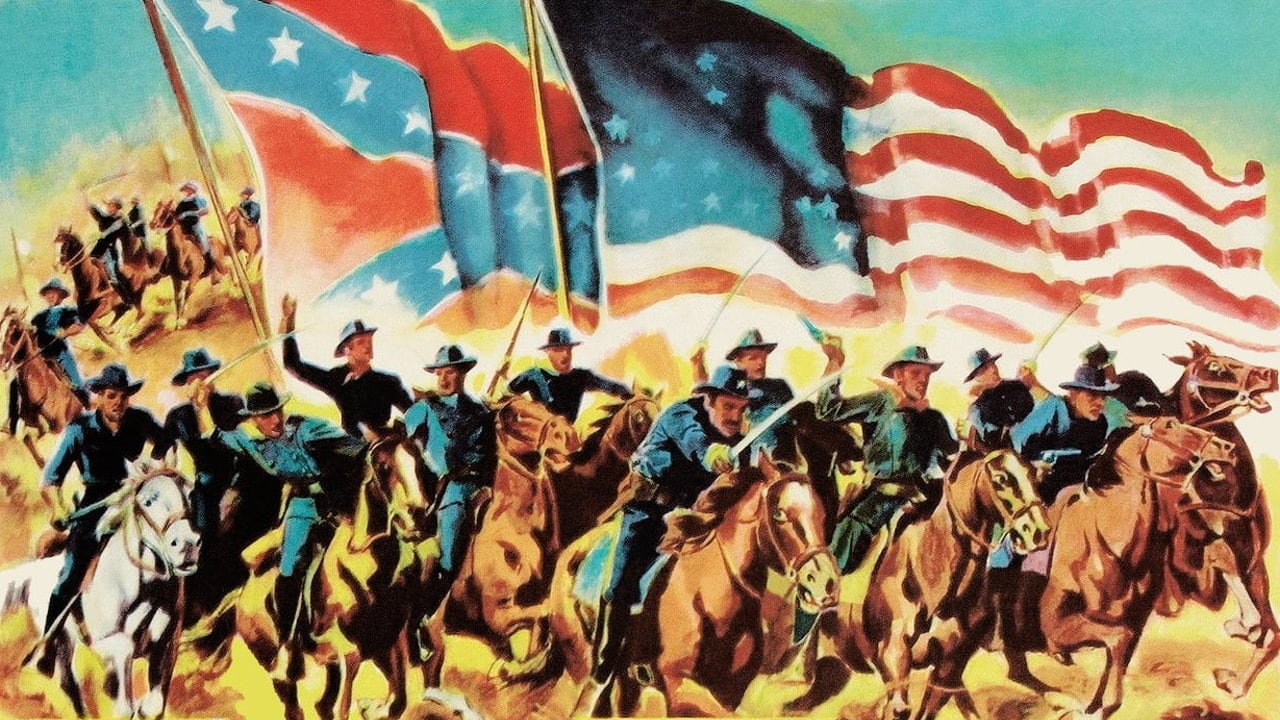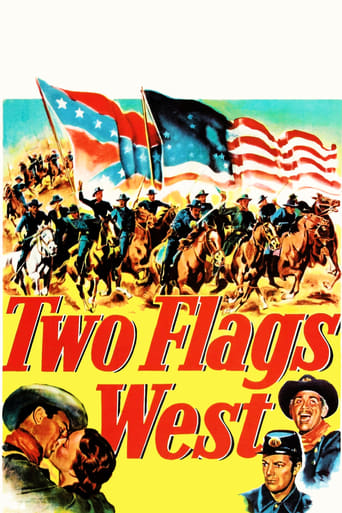



recommended
I wanted to like it more than I actually did... But much of the humor totally escaped me and I walked out only mildly impressed.
View MoreIt is interesting even when nothing much happens, which is for most of its 3-hour running time. Read full review
View MoreA great movie, one of the best of this year. There was a bit of confusion at one point in the plot, but nothing serious.
View More"Two Flags West" starts off feeling like it will be a rather clichéd affair: Cornel Wilde as an honor-bound good guy, the Confederate soldiers unreconstructed and unbowed, Jeff Chandler as an unmovable rebel-hater, and so on. But stick with it: "Two Flags West" develops into an unusually smart movie in which the strands of plot do not end predictably (for example, the expected flourishing of love between Linda Darnell and somebody, anybody, never occurs), and the dialogue becomes increasingly nuanced and thoughtful.This is a movie whose intelligence does not insult your intelligence.Joseph Cotton has always fascinated me. He is not particularly handsome, always looking older than he probably is, and his voice is strangely distinctive. But he is a wonderful actor, and his Southern Colonel is more than just obviously conflicted about whether he should stay with, or abandon, the Union army with his men: his conflict is more subtle, as he ponders where his future ultimately lies in a post-Civil War country; his very interesting dialogues about this with Linda Darnell, especially toward the end of the film, are quite pleasing to this lover of Westerns (me), who otherwise cheerfully acknowledges the clichés that often dominate this genre.The battles with the Indians are violent and nasty: we really suffer with the lonely horse soldiers of the west who are slaughtered in the fort. And the glorious black and white photography does a great job of bringing out the loneliness and understated beauty of the plains (though filmed in New Mexico) (contrast John Ford's celebratory treatment of Monument Valley).A great little Western with unexpected endings to the various strands of plot. It will leave you exceptionally fulfilled and pleased at the end.
View More"Two Flags West" is a real surprise, entertaining and powerful. It contains its share of Hollywood clichés: Yankees and Rebels teaming up to fight Indians; an unhinged officer commanding a lonely outpost; a beautiful women creating tension among comrades in arms. But it's original in the way it handles them.Jeff Chandler plays Maj. Henry Kenniston, a Union officer put in charge of a desert fort after being partially disabled by a war wound. Distrustful of Indians and bitter about his assignment, he dreams of returning to the war and taking revenge on the Confederates who hurt him and killed his brother. Worst of all, Kenniston is obsessed with his brother's widow (played by Linda Darnell). He's an honorable man in his own way, and he feels a genuine sense of responsibility toward her. He tells himself he's keeping her at the fort for her own protection. But in his heart, he lusts after her, and he hates himself for doing so.When reinforcements arrive at this troubled outpost, Kenniston is shocked to find that most are former Confederate POWs. They have pledged to serve the Union as Indian fighters as long as they don't have to make war on fellow Southerners. To the already unstable major, being put in command of such troops is a crushing insult. And it doesn't help his state of mind when the Southerners' leader (played by Joseph Cotten) and an idealistic Union officer (played by Cornel Wilde) begin to show interest in the beautiful widow themselves. Kenniston soon embarks on a course of action guaranteed to alienate both the Indians and the Southerners -- and endanger the peace."Two Flags West" is a well plotted western, with events that flow from the characters' motivations instead of from a predictable plot. It's full of action, and its violence is grimly realistic for the time it was made. Chandler is excellent as a complex, disastrous leader who inspires anger, pity and even some admiration in the viewer. Darnell, in one of her better roles, makes a convincing object of desire. Cotten and Wilde are fine, although they could have switched roles and still been just as effective. Any fan of westerns ought to enjoy this a lot, and non-fans should give it a look.
View MoreJeff Chandler is cast against type (and does a terrific job) in this big-budget western as the commander of a cavalry fort in the West during the Civil War who hates both Indians and Southerners with equal passion. With his command stripped to the minimum due to the Union's need for troops to fight the Civil War back east, Chandler is forced to accept a unit of Confederate prisoners who have volunteered to fight Indians under Union command as an alternative to rotting in POW camps. Chandler's all-consuming hatred and racism result in his killing the son of the local Indian chief, which causes the Indians to go on a rampage against the whites in the area, culminating in a massive attack against the fort itself. This is a dark, gritty and, considering the time in which it was made, brutally graphic and violent western that explores and exposes issues--racism, sexual tension, even a hint of mental illness--seldom, if ever, touched upon by westerns up to that time. The supporting performances by Joseph Cotten, Linda Darnell and especially the great--and always underrated--Arthur Hunnicutt are top-notch, but this really belongs to Chandler, and he does a tremendous job, as good as (and in some ways better than) what is usually considered to be his finest performance, that of Indian chief Cochise in "Broken Arrow" of a few years later. Chandler was never a particularly expressive or emotional actor--when he tried to be, the results sounded more like a lecture (his speech at the end of "Pillars of the Sky" is a case in point)--but his coldness works to his advantage here, which makes his bursts of anger and hatred all the more chilling. This is an intelligent and thoughtful yet also rousing and action-filled western, hardly your run-of-the-mill cavalry-vs.-Indians tale. I don't think this would be the kind of western John Ford would have made, and it's probably the better for it. Don't miss it.
View MoreI first saw this movie when it came out and it has remained my favorite cavalry movie of all time. Yes, even more than the great ones John Ford produced, but not by much. In this story a detachment of cavalry is called upon to defend the plains and west from the Indians who have taken advantage of the Civil War to wreak havoc among the settlers, trappers, and gold seekers. This unit, however, has former prisoners from the CSA, who have been remanded from prison to serve in the west with the Yankee cavalry. If one knows anything about prison conditions in the north or south during the war, it is not difficult to see why many southern prisoners opted for service against the Indians. During World War II, the Germans got many Europeans and Russian prisoners to fight for them as the alternative in prison camps was tantamount to death. This story centers around a fort commanded by Jeff Chandler character, who tricks an Indian chief, killing, I believe his son or brother. The enraged chief attacks the fort with overwhelming force and only when Jeff Chandler goes out of the fort to trade his life for those left in the fort, does the attack stop with his sacrificial death. After a relief column arrives at the fort, do the survivors learn that the war is over and the south has lost. An interesting bit of history and true. Unfortunately there was another aspect to the Indian wars on the plains that has received short shrift, and that is the service rendered by the Ninth and Tenth Cavalry regiments: the Buffalo soldiers; the all-black army units who served faithfully and with honor for over twenty years, trying to subdue a people who wanted to live free for the benefit of a government that treated these soldiers as second class citizens. To my memory, only two films have been made about these Buffalo soldiers, and both 30 years apart. Yes, Two Flags West ably covers the part that southern prisoners played in the settling of the west, but it has taken too long to tell the story of the black soldiers who, often facing discrimination within the army itself, and trouble from white settlers, still carried out their duty. I hope that this fine film, Two Flags West, will come out in VHS soon.
View More